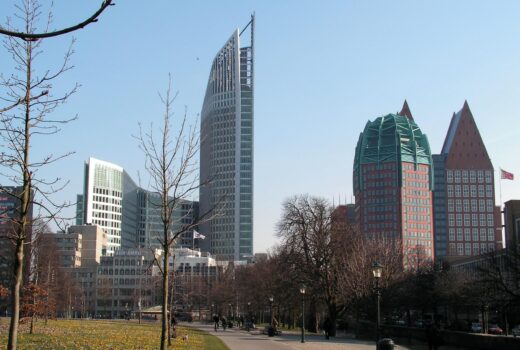Students shift to political left during higher education

Student’s political views become slightly more left-oriented and more positive towards immigration during their time in higher education, British research shows. According to Tom Fyer (University of Manchester), political literature suggests higher education plays a role in recent polarization around topics like the Brexit, the Trump-election and coronavirus policy. His statistical analysis partly explains why people that spent time in higher education seem more likely to hold leftist views than those who never attended higher education.
Political identity and ethnocentrism
In his research, Fryer used data from the British Election Study (BES). The BES analyses the results of British elections using surveys of around 30.000 people, covering questions about the respondent’s background, beliefs and voting behavior. For this study, Fryer conducted both a cross-sectional and a longitudinal analysis. In the former, he compared the political views of both people with and without experience in higher education, using data of over 28.000 respondents. In the second analysis, Fryer used 500 responses to analyze how students’ political views change during their time in higher education.
De wekelijkse nieuwsbrief is nog korte tijd gratis te ontvangen. De voorwaarden vindt u hier.
The respondents were reviewed on left-right identity and ethnocentrism. In the BES, people were asked to report on their political identity on an 11-point scale. If the response fell in the 0 to 4-range , the respondent was considered left-oriented; answers ranging from 4 to 6 were considered ‘center’ and everything from 7 and higher was considered right-oriented. To test for ethnocentrism, the respondents reported their attitude on whether ‘immigration undermines or enriches Britain’s cultural life’ on a 7-point scale. Answers ranging from 1 to 3 were deemed ‘anti-immigration’, 4 was ‘center’ and answers ranging from 5 to 7 were labelled ‘pro-immigration’.
Mostly centered
The longitudinal analysis showed that those with experience in higher education were more often left-oriented than those without. However, this pattern only occurred within groups of the same age. For example, of the HE-graduates aged 66+, 21,9 percent were left-oriented and 33,5 percent were right-oriented. However, among the non-graduates from this group, even less identified as politically left, so the pattern of more graduates being politically left is maintained.
Overall, most people identified with a position at the center of the scale and the average difference between graduates and non-graduates was 1 point to the left (on the 11-point scale). There was only a majority of left-oriented respondents in the younger age groups; of those under 25 more people identified as politically left than center or right, as well as respondents under 35 with HE-experience.
Woke
The results on ethnocentrism show a more polarized territory. As expected, those with higher education experience reported positive attitudes towards immigration more often. Additionally, the most common score for all respondents with HE-experience (except for the 66+ age group) was 7, the highest possible ‘pro-immigration’ score. According to Fryer, this corroborates arguments that immigration is seen as a moral issue. “By thinking in terms of moral rights and wrongs, people tend to be pushed towards the ends of the scale”, he writes.
This corresponds to the way some people experience the rise of wokeness in higher education. Some Dutch academics have previously expressed concerns about experienced hostility from woke students threatening their academic freedom.
A bigger change
In the longitudinal study, Fryer compared the data of respondents that reported to be in higher education for three consecutive years. He found a small increase in the percentage of students that identified as politically left; 34,1 percent in year one, 35,2 percent in year 2 and 38,2 percent in year 3. Likewise, the percentage of right-leaning students dropped from 13,2 to 12,4 to 11,5. On an individual level, however, most students reported their political orientation did not change at all, showing a relatively stable environment.
Considering ethnocentrism, students became more positive towards immigration during their years in higher education. Of the third-year students, 29,2 percent opted for the highest score, while only 22,0 percent of first-year students reported this score. On average, the score increased by 0,4 points (on a 7-point scale), implying an increased positive attitude towards immigration. During their years in higher education, students’ attitude towards immigration changed more than their political orientation.
Force political views on students
The differences between those who have experience in higher education and those that don’t are small, but still significant, Fryer writes. Considering the difference in political identity between graduates and non-graduates (1 point on the 11-point scale), a shift of 0,2 points means the students’ shift to the left during higher education enrollment accounts for 20 percent of the difference. Using the same reasoning for the respondents’ view on immigration, experience higher education accounts for 35,9 percent of the difference.
These results suggest spending time in higher education partly accounts for the difference in political views between those with and those without experience in higher education. Additionally, Fryer points out that this study debunks the idea that higher education institutions force their political views onto students, since the shift is small and does not fully explain the difference in views.
Unfortunately, the study cannot explain how higher education influences students’ political views. Prior research suggests that the social context and extra-curricular activities like student unions play a role, Fryer points out. Also, subject areas such as political science might impact the political orientation of students.
Meest Gelezen
Vrouwen houden universiteit draaiende, maar krijgen daarvoor geen waardering
Wederom intimidatie van journalisten door universiteit, nu in Delft
Hbo-docent wil wel rolmodel zijn, maar niet eigen moreel kompas opdringen
‘Burgerschapsonderwijs moet ook verplicht worden in hbo en wo’
Raad van State: laat taaltoets nog niet gelden voor hbo-opleidingen



